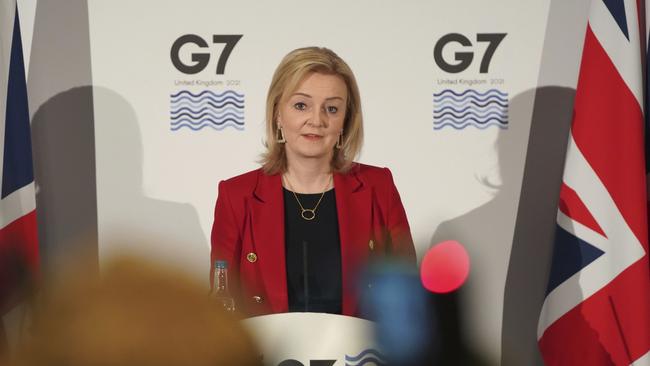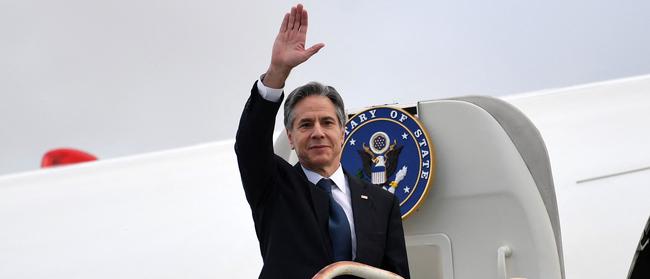G7 warns Iran, Russia: time almost up
Western leaders say time is running out for Iran to agree on a deal to curb its nuclear ambitions and warn Russia of ‘massive’ consequences if it invades Ukraine.

Western leaders say time is running out for Iran to agree on a deal to curb its nuclear ambitions, and have warned Russia of “massive” consequences if it invades Ukraine.
British Foreign Secretary Liz Truss said that resumed talks in Vienna were Iran’s “last chance to come to the negotiating table with a serious resolution”.
“There is still time for Iran to come and agree this deal,” she said at the G7 summit of foreign ministers in Liverpool, England, on Sunday.
The final communique from the two-day talks said Iran “must stop its nuclear escalation and seize the opportunity to conclude a deal, while this is still possible”.
Negotiations restarted last Thursday to try to revive the 2015 deal between Iran and world powers, which the US withdrew from under Donald Trump in 2018.
Iran claims it wants only to develop a civilian capability but Western powers say its stockpile of enriched uranium goes well beyond that, and could be used to develop a nuclear weapon.
US President Joe Biden has said he is ready to return to the agreement and Iranian officials maintain they are serious about committing to the talks. But Tehran has been accused of backsliding on progress made earlier this year and playing for time.
Ms Truss’s comments are the first time a signatory to the original deal has given an ultimatum for the talks.
Britain, which hands over the G7 presidency to Germany next year, portrayed the Liverpool conference as a chance to stand up to authoritarianism around the world.
As well as Iran, Russia’s build-up of troops on the border with Ukraine dominated talks, given fears of a possible invasion of the former Soviet state.
Ms Truss said there was “very much a united voice … that there will be massive consequences for Russia in the case of an incursion into Ukraine”.
In the final communique, ministers unanimously backed Ukraine’s territorial integrity and sovereignty, praising President Volodymyr Zelensky for Kiev’s “posture of restraint”.
All options, including wide-ranging political and economic sanctions, are on the table if Russia ignores a diplomatic solution, officials indicated.
A senior US State Department official on Saturday said “a large number of democratic countries” were ready to join the G7 nations of Britain, Canada, France, Germany, Italy, Japan and the US in taking action. Mr Biden earlier last week held a virtual summit with Russian counterpart Vladimir Putin to voice Western concerns.
He is sending his top diplomat for Europe and Eurasian affairs to Kiev and Moscow this week for follow-up talks with officials.
Russia says the military build-up is a defensive measure against Ukraine moving closer to NATO.

US Secretary of State Antony Blinken flew out of Britain to Southeast Asia as part of Washington’s push for “peace, security and prosperity” in the Indo-Pacific.
Britain’s G7 presidency this year has been dominated by responding to Beijing’s alleged widespread domestic rights abuses, as well as creeping authoritarianism in its former colony, Hong Kong.
Earlier last week, a panel of human rights experts and lawyers in London said China had committed genocide in its Xinjiang region by imposing population controls on minority Muslim Uighurs.
Beijing rejected the report, accusing it of “anti-China” bias. Ministers from the Association of South East Asian Nations (ASEAN) took part in talks with the G7 for the first time, with concerns high about security in the South China Sea.
Ms Truss said she and her counterparts were concerned about China’s “coercive economic policies” and there was a need to counter them with their own initiatives as an alternative.
“What we want to do is build the investment reach, the economic trade reach of like-minded freedom-loving democracies,” said. “That is why we’re stepping up our investment into low and middle-income countries.”
At a G7 leaders’ meeting in June the grouping unveiled plans for what it said was a more equitable global infrastructure fund than China’s Belt and Road Initiative.
The Chinese trillion-dollar scheme has been widely criticised for saddling smaller, poorer countries, particularly in Africa, with unmanageable debt.
AFP



To join the conversation, please log in. Don't have an account? Register
Join the conversation, you are commenting as Logout